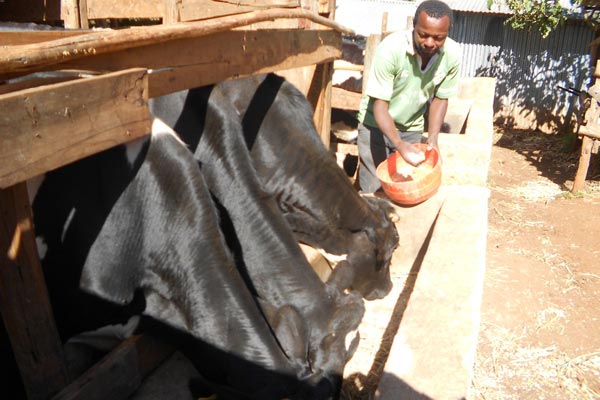Steve Mwicigi is no doubt a happy farmer producing 65 litres of milk every day from two cows on his 100 by 100ft plot in Gatamaiyu, Kiambu County.
The 31-year-old father of two lives in the same plot with his 13 Friesian cows out of which two are lactating, while the rest are either nursing advanced pregnancies or too young.
He earns Sh35 a litre from the milk he sells to Uplands Premium Dairy, which collects the produce at his doorstep.
Out of his total earnings, Mwicigi spends about Sh30,000 every month to buy feeds and other inputs and pay for services.
“My income will go up more than three times,” he says, his optimism boosted by the good prevailing market and prompt payment he is enjoying. But he discloses that the other cows likely to calve in a few months are pedigree, with each expected to exceed the current 35 litres a cow.
Mwicigi used to supplement his earnings by doing menial jobs but is now self-employed on the quarter acre land. He does mot of the feeding, cleaning, milking and sourcing for feeds. It has taken Mwicigi effort, luck and perseverance to be where he is.
Four years ago, the best he could earn from milk was Sh20 to 28 a litre. “Besides the poor pay, you had to carry milk to the brokers who controlled the business. They were never consistent in paying and most times they ran away with our money.”
FARMERS EXPLOITED
The dairy industry had been the main source of livelihood in Kiambu after tea and coffee prices plummeted. “This was aggravated by exploitation of dairy farmers by milk processors and brokers. Big milk processors capitalised on our desperation and offered as low as Sh15 per litre. We had no option but to either give them the milk or let it go to waste,” he says.
At that time Gatamaiyu was crime-ridden sparking a migration of able-bodied people to Nairobi, Kiambu and Limuru towns. Felix Wanjohi, the general manager of Uplands Premium Dairy (which makes Pascha milk brand) says when they started they were collecting 4,000 litres a month.
They now aim to hit 10,000 litres by the end of this year with a total of 10,000 members.
They will all be supported in farm management, breeding, clinical services, disease control and genetic management of the animals.
“We have developed a data base which enables the office to detect the reduction of milk production of any registered cow. The company can then alert the farmer long before he has realised there is a problem,” says Wanjohi, who believes that Pascha milk products must be produced by happy and healthy families.
Listening to Wanjohi projecting how to meet his 40,000 litres milk demand, one can see his vision of transforming the community beginning to bear fruits. Rental houses for the 120 employees in the factory have come up deep in the farms. Residents are also pleased with other benefits such as improved roads, construction of petrol stations and shopping centres in the once sleepy village.









